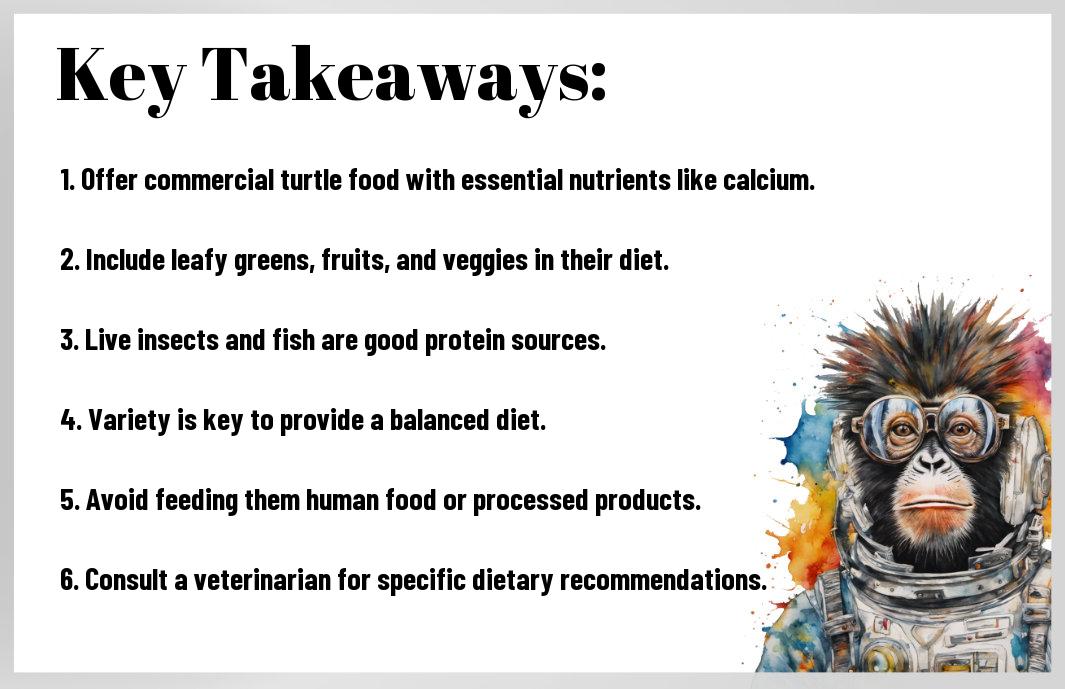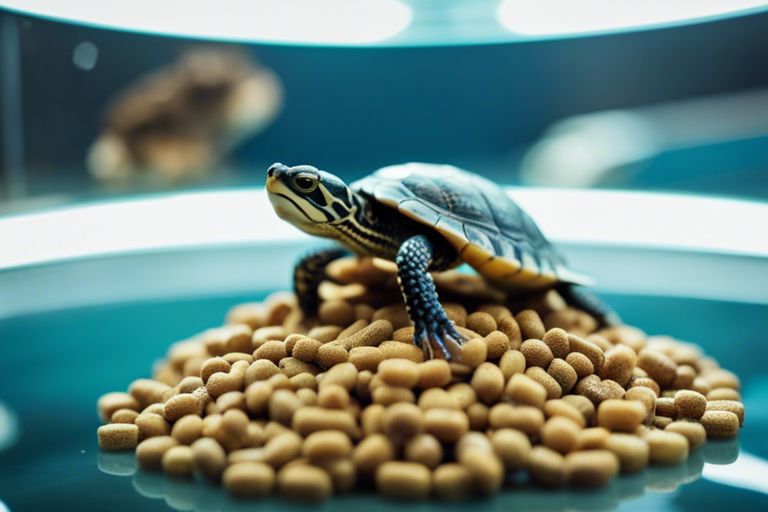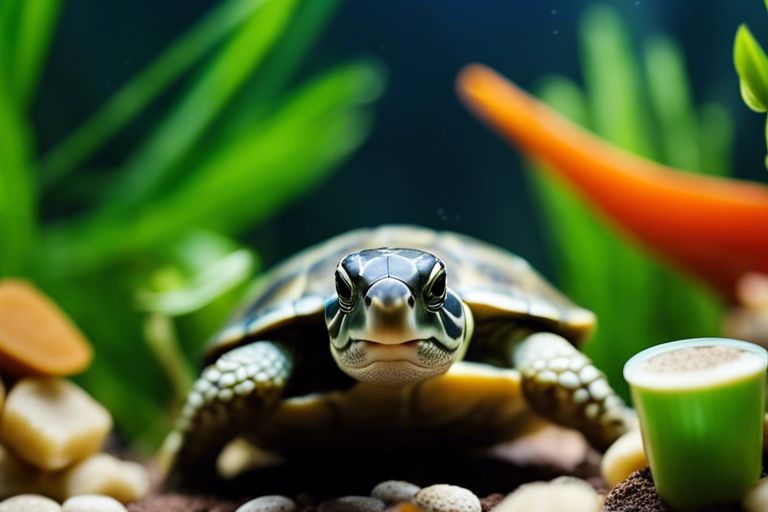Most new turtle owners may not be aware of the importance of providing proper nutrition to their baby turtles. Feeding these young reptiles the right diet is essential for their growth and development. In this blog post, we will discuss the best foods to feed baby turtles to ensure they thrive and stay healthy.
Key Takeaways:
- Commercial turtle pellets: Provide a balanced diet with essential nutrients for baby turtles.
- Fresh vegetables and fruits: Offer a variety of veggies like dark leafy greens, carrots, and fruits like berries for additional nutrients.
- Protein sources: Include insects, worms, and small fish to meet the protein needs of growing baby turtles.

Understanding the Diet of Baby Turtles
The diet of a baby turtle is crucial for its growth, development, and overall health. As a responsible pet owner, it is essential to understand the nutritional needs of baby turtles to ensure they thrive in captivity.
Nutritional Needs
To meet the nutritional needs of baby turtles, it is important to provide them with a well-balanced diet. Protein is crucial for their growth, and young turtles require a diet rich in sources of protein such as insects, worms, and commercial turtle pellets. Calcium is essential for their shell development, so including sources of calcium like cuttlebone or calcium supplements is necessary. Additionally, vitamins and minerals should be incorporated into their diet to support overall health and prevent deficiencies.
It is important to note that overfeeding can lead to health problems such as obesity and shell deformities in baby turtles. Feeding them in moderation and monitoring their intake is key to keeping them healthy. Consult with a veterinarian or reptile expert to create a diet plan tailored to your baby turtle’s specific needs.
Natural Diet in the Wild
In the wild, baby turtles have a diet that consists of a variety of foods depending on their species. They typically feed on aquatic plants, insects, small fish, and crustaceans to meet their nutritional requirements. Mimicking their natural diet in captivity can be challenging but essential for their well-being.
Wild baby turtles have the advantage of foraging for a diverse range of foods, which provides them with essential nutrients and variety in their diet. They also benefit from the exercise of hunting and searching for food, which helps keep them active and healthy. Providing enrichment activities and varied food items can help replicate a more natural feeding experience for baby turtles in captivity.
Turtles in the wild face dangers from predators and environmental threats, but they have evolved to adapt to their surroundings and find suitable food sources. Understanding their natural diet can help us create a more enriching and fulfilling feeding routine for baby turtles in captivity.
Feeding Your Baby Turtle
If you have recently welcomed a baby turtle into your home, you may be wondering what the best diet is to ensure their proper growth and health. Feeding your baby turtle a balanced and nutritious diet is essential for their development. In this guide, we will explore the different food options available for your baby turtle and provide tips on how to ensure they are getting all the essential nutrients they need.
Commercial Turtle Food
Any pet store will have a variety of commercial turtle foods designed specifically for the dietary needs of turtles. These foods typically come in the form of pellets, sticks, or blocks and are formulated to provide your baby turtle with a balanced diet. When selecting a commercial turtle food, look for options that are specifically made for baby turtles, as they will have the right balance of nutrients needed for their growth.
It is important to follow the feeding instructions on the packaging and not overfeed your baby turtle. Overfeeding can lead to obesity and other health issues. Additionally, make sure to provide fresh water at all times for your baby turtle to stay hydrated.
Preparing Fresh Foods
Feeding your baby turtle a variety of fresh foods is also important for their overall health. Fresh foods such as leafy greens, vegetables, and fruits should be offered as part of their diet. These foods can be chopped into small, bite-sized pieces to make it easier for your baby turtle to consume.
When preparing fresh foods for your baby turtle, make sure to wash them thoroughly to remove any pesticides or chemicals. It is also recommended to rotate the types of fresh foods you offer to ensure your baby turtle is receiving a wide range of nutrients.
Your baby turtle will benefit from a diet that includes a mix of commercial turtle food and fresh foods. Keep a close eye on their eating habits and adjust their diet as needed to ensure they are growing and thriving. Keep in mind, providing a balanced and nutritious diet is key to keeping your baby turtle healthy and happy.
Feeding Schedules and Quantities
Frequency of Feeding
Keep in mind that baby turtles, like all young animals, have high energy levels and fast metabolisms. This means that they require more frequent feeding compared to adult turtles. Any baby turtle should be fed daily when they are under a year old to support their growth and development. Providing small, nutritious meals regularly throughout the day will keep your baby turtle healthy and active.
It is essential to establish a feeding schedule and stick to it. Any deviation can lead to health issues or malnutrition. Remember that consistency is key when it comes to feeding schedules for baby turtles.
Portion Sizes
The key to feeding a baby turtle is to offer the right portion size at each meal. The portion size should be about the size of their head. Overfeeding can lead to obesity and health problems in turtles. It is important to monitor their growth and adjust portion sizes accordingly as they get older.
A good rule of thumb is to offer as much food as they can consume in a few minutes. Remove any uneaten food to maintain the cleanliness of their habitat and prevent overfeeding. Consistency in portion sizes will help you establish a healthy diet for your baby turtle.
Common Mistakes to Avoid
Not understanding the dietary needs of a baby turtle can lead to various mistakes that may affect its health and well-being. Here are some common errors to avoid when feeding your baby turtle.
Overfeeding Issues
Any novice turtle owner might unintentionally overfeed their baby turtle due to a lack of knowledge about appropriate portion sizes. Overfeeding can lead to obesity, shell deformities, and other health issues. It’s essential to feed your baby turtle the correct amount of food based on its size and age to prevent overfeeding problems.
Any sudden changes in the feeding schedule or offering an excessive amount of food at once can overwhelm a baby turtle’s digestive system. This can result in digestion issues, such as bloating, constipation, and even potential health complications. It’s crucial to follow a consistent feeding routine and provide the right portions to avoid overfeeding problems.
Inappropriate Food Choices
Food plays a crucial role in a baby turtle’s growth and development. Providing inappropriate food choices can lead to nutritional deficiencies, digestive problems, and overall poor health. Avoid feeding your baby turtle foods that are high in fats, sugars, or lacking essential nutrients.
Inappropriate food choices for baby turtles include processed foods, such as bread, dairy products, and human snacks. These items do not provide the necessary nutrients for a baby turtle’s growth and can lead to serious health issues if consumed regularly. Stick to a diet that consists of fresh vegetables, commercially available turtle pellets, and occasional treats like small insects or worms for optimal nutrition.
Special Considerations for Aquatic vs. Terrestrial Baby Turtles
Now, when it comes to feeding baby turtles, it’s essential to understand the differences between aquatic and terrestrial species. Each type of turtle has specific dietary requirements that cater to their natural habitat and lifestyle.
Diet for Aquatic Baby Turtles
Turtles that spend the majority of their time in water have a diet that consists mainly of aquatic plants, insects, small fish, and invertebrates. Commercial turtle pellets specifically formulated for aquatic turtles are a good option for ensuring they receive the necessary nutrients.
It is important to note that overfeeding aquatic baby turtles can lead to obesity and health issues. Offer a balanced diet and monitor their food consumption to prevent overindulgence.
Diet for Terrestrial Baby Turtles
Baby turtles that live on land have a diet that includes vegetables, fruits, leafy greens, and the occasional insect or protein treat. It’s crucial to provide a variety of foods to ensure they receive all the essential nutrients for growth and development.
This type of turtle may also benefit from the addition of calcium supplements to their diet to support healthy shell growth. Consult with a reptile veterinarian to determine the appropriate dosage for your terrestrial baby turtle.

Monitoring Your Baby Turtle’s Health
Unlike other pets, baby turtles require a specific diet to thrive. To ensure your baby turtle remains healthy, monitoring its health is crucial. This includes observing its behavior, physical appearance, and overall well-being on a regular basis.
Signs of Proper Nutrition
Turtles that are receiving proper nutrition will display a vibrant shell, clear eyes, and an active demeanor. They will have a healthy appetite and readily accept a variety of foods. Properly nourished baby turtles will also exhibit steady growth and development, making noticeable progress over time.
Identifying Nutritional Deficiencies
Nutritional deficiencies can manifest in various ways in baby turtles. Common signs include soft or misshapen shells, swollen eyes, lethargy, refusal to eat, and stunted growth. If you notice any of these symptoms, it is crucial to address them promptly to prevent further health complications.
Deficiencies in essential nutrients like calcium and vitamin D can lead to serious health issues such as metabolic bone disease, which can be life-threatening if left untreated. It is important to consult with a veterinarian specializing in reptiles if you suspect any nutritional deficiencies in your baby turtle.
Conclusion
Summing up, when it comes to feeding a baby turtle, it is essential to provide a well-balanced diet that includes both commercial turtle pellets and fresh foods like leafy greens, vegetables, and occasional protein sources. It is crucial to ensure they receive adequate calcium and Vitamin D3 for their shell and overall health. Avoid feeding them human food, processed foods, or excessive amounts of protein. By following these recommendations, you can help your baby turtle grow and thrive in a healthy and sustainable manner.





Leave a Reply